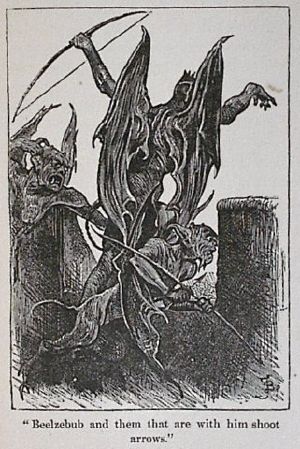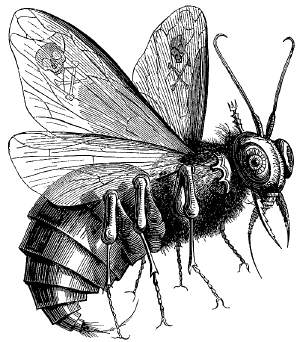Beelzebub
- This article is about the supernatural being. For other uses of the term, see Beelzebub (disambiguation).
Ba‘al Zebûb or Ba‘al Zəvûv (Hebrew בעל זבוב, with numerous variants)[1] appears as the name of a deity worshipped in the Philistine city of Ekron.
In ancient contexts, there appears to have been little, if any, meaningful distinction between Beelzebub and the polytheistic Semitic god named Ba‘al. Monotheistic Jewish reference to Baal was almost certainly pejorative, and grew to be used among other terms for Satan. The name later appears as the name of a demon or devil, often interchanged with Beelzebul.
Examination has sought to interpret the meaning of Baal in context to determine the specific reasons for this connotation, and varied religious speculations have run the gamut.
Regardless, the demonization of the deity or deification is thought to have been one basis for the personification of Satan as the adversary of the Abrahamic God, though other influences such as the Zoroastrian Daeva may have contributed.
Religious meaning
Ba‘al Zebûb might mean 'Lord of Zebûb', referring to an unknown place called Zebûb, or 'Lord of things that fly' (zebûb being a Hebrew collective noun for 'fly', thus the common lay translation 'Lord of the Flies'). Thomas Kelly Cheyne suggested that it might be a derogatory corruption of Ba'al Zebul, 'Lord of the High Place', or 'Lord of Heaven'.[2] The SeptuagintA renders the name as Baalzeboub, SeptuagintB as Baal myîan 'Baal of flies', but Symmachus the Ebionite may have reflected a tradition of its offensive ancient name when he rendered it as Beelzeboul (Cath.Ency.).
The source for the name Ba‘al Zebûb / Beelzebub is in 2 Kings 1.2–3,6,16 where King Ahaziah of Israel, after seriously injuring himself in a fall, sends messengers to inquire of Ba‘al Zebûb, the god of the Philistine city of Ekron, to learn if he will recover.
- Ahaziah fell through the lattice in his upper chamber at Samaria and was injured. So he sent messengers whom he instructed: "Go inquire of Baal-zebub, the god of Ekron, whether I shall recover from this injury." (JPS translation)
Elijah the Prophet then condemns Ahaziah to die by Yahweh's words because Ahaziah sought counsel from Ba‘al Zebûb rather than from Yahweh.
In Christianity, the name Beelzebub or Beelzebul may appear as an alternate name for Satan or else may appear to refer to the name of a lesser devil. As with several religions, the names of any earlier foreign or "pagan" deities often became synonymous with the concept of an adversarial entity.
In Mark 3, verse 22, the Pharisees accuse Jesus of driving out demons by the power of Beelzeboul, prince of demons, the name also appearing in the expanded version in Matthew 12.24,27 and Luke 11.15,18–19. The name also occurs in Matthew 10.25.
- Jesus knew their thoughts and said to them, Every kingdom divided against itself will be ruined, and every city or household divided against itself will not stand. If Satan drives out Satan, he is divided against himself. How then can his kingdom stand? And if I drive out demons by Beelzebub, by whom do your people drive them out? So then, they will be your judges. But if I drive out demons by the Spirit of God, then the kingdom of God has come upon you. (NIV translation)
It is unknown whether Symmachus was correct in identifying these names or not since we otherwise know nothing about either of them. Zeboul might derive from a slurred pronunciation of zebûb; from 'zebel', a word used to mean 'dung' in the Targums; or from Hebrew zebûl found in 1 Kings 8.13 in the phrase bêt-zebûl 'lofty house' and used in Rabbinical writings to mean 'house' or 'temple' and also as the name for the fourth heaven.
In any case the form Beelzebub was substituted for Belzebul in the Syriac translation and Latin Vulgate translation of the gospels and this substitution was repeated in the King James Version of the Bible, the result of which is the form Beelzebul was mostly unknown to western European and descendant cultures until some more recent translations restored it. In summary, it is unknown if either or both of these names were a title applied to persons, to divinities exclusively, or otherwise were a corruption of such a title, possibly as a denigration.
Apocryphal literature
In the Testament of Solomon, Beelzebul (not Beelzebub) appears as prince of the demons and says (6.2) that he was formerly a leading heavenly angel who was (6.7) associated with the star Hesperus (which is the normal Greek name for the planet Venus (Αφροδíτη) as evening star). Seemingly Beelzebul is here simply Satan/Lucifer. Beelzebul claims to cause destruction through tyrants, to cause demons to be worshipped among men, to excite priests to lust, to cause jealousies in cities and murders, and to bring on war.
Texts of the Acts of Pilate (also known as the Gospel of Nicodemus) vary in whether they use Beelzebul or Beelzebub. The name is used by Hades as a secondary name for Satan. But it may vary with each translation of the text, other versions give the name Beelzebub as Beelzebub, but separates him from Satan.
Later accounts

Beelzebub is commonly described as placed high in Hell's hierarchy; he was of the order of cherubim. According to the renowned 16th century occultist Johannes Wierus, Beelzebub is the chief lieutenant of Lucifer, the Emperor of Hell, and presides over the Order of the Fly. Similarly, the 17th century exorcist Sebastien Michaelis, in his Admirable History (1612), placed Beelzebub among the three most prominent fallen angels, the other two being Lucifer and Leviathan, whereas two 18th century works identified an unholy trinity consisting of Beelzebub, Lucifer, and Astaroth. John Milton featured Beelzebub as seemingly the second-ranking of the many fallen cherubim in the epic poem Paradise Lost, first published in 1667. Wrote Milton of Beelzebub "than whom, Satan except, none higher sat." Beelzebub is also a character in John Bunyan's The Pilgrim's Progress, first published in 1678.
Sebastien Michaelis associated Beelzebub with the deadly sin of pride. However, according to Peter Binsfeld, Beelzebub was the demon of gluttony, one of the other seven deadly sins, whereas Francis Barrett asserted that Beelzebub was the prince of false gods. In any event, Beelzebub was frequently named as an object of supplication by confessed witches. After being accused by the Pharisees of possessing Jesus, he has also been held responsible for at least one famous case of alleged demon possession which occurred in Aix-en-Provence in 1611 involving a nun by the name of Sister Madeleine de Demandolx de la Palud who named one Father Jean-Baptiste Gaufridi as a bewitcher of young nuns. Beelzebub was also imagined to be sowing his influence in Salem, Massachusetts: his name came up repeatedly during the Salem witch trials, the last large-scale public expression of witch hysteria, and afterwards Rev. Cotton Mather wrote a pamphlet entitled Of Beelzebub and his Plot.[3]
In the small town of South Windsor, Connecticut there is a road called Beelzebub, due to a rumor of an exorcism.
In Popular Culture
The British band Queen mentions Beelzebub in their famous song Bohemian Rhapsody.
Referred to as Beezleboss in the "The Final Showdown" of the Tenacious D movie "The Pick of Destiny," Beezlebub was mentioned by his true name in the opening song "Kickapoo" by Meatloaf.
Beelzebub is also mentioned in "The Wish List," by famous author Eoin Colfer.
Ba'alzamon is the name of one of the principal antagonists in The Wheel of Time. At the beginning of the plot it was believed to be the Trolloc name for the Dark One, but has been revealed as Ishmael, one of the thirteen Forsaken.
Beezlemon from the Digimon series takes his name from Beezlebub.
Beelzebub apears in Ragnarok Online as a Game Boss.
Beelzebub appears in the video game Shin Megami Tensei III: Nocturne Maniax as a boss in the Fourth Kappa. He challenges the character's strength to see if he is worth to lead demon kind for his master. Beelzebub also appeared in Persona 3 as the Ultimate Persona of the Devil Arcana. Also can be found in Devil Summoner: Raido Kuzonoha vs. the Soulless Army as an optional boss. His design is similar to how he appears in the Dictionnaire Infernal, as are many other demons in the series.
Beelzebub also appeared in Castlevania: Symphony of the night as a boss. He is portrayed as a giant rotting corpse, hanging from chains, attacking with flies.
The novel The Lord of the Flies is thought to refer to Beelzebub's English translation. Here Beelzebub is depicted as the rotting head of a sow.
Beelzebub appears in the comic book series "The Sandman" By Neil Gaimen. He is shown as ruler of hell alongside Lucifer and another demon.
Episode 205 of the computer game series Sam and Max is called "What's new Beelzebub," referring to Satan who appears in the episode.
The virtual band Gorillaz bass player Murdoc acclaims the band climbing the charts to a crooked deal he made with Beelzebub. That resulted to Noodle being kidnapped because Murdoc never gave his soul.
Further reading
- The Dictionary of Angels by Gustav Davidson, © 1967.
- Fallen Angels...and Spirits of the Dark by Robert Masello ©1994.
- The Access Bible. New Revised Standard Version. Oxford University Press. ©1999
- The Sacred Magic of Abramelin the Mage, Book I, II, & III. Translated By: S. L. MacGregor Mathers.
- Grimoirium Verum or The True Grimoire. The Most Approved Keys of Solomon The Hebrew Rabbi. Translated From The Hebrew by Plangiere, Jesuit Dominicane. Edited, With A Preface By James Banner, Gent. Originally Published By Alibeck The AEgyptian at Memphis 1517. PDF edition, 1999 Phil Legard
Notes and references
- ↑ In addition to Beelzebub, Ba‘al Zebûb, and Ba‘al Zəvûv, (בעל זבוב), there are several variants such as Belzebud, Beezelbub, Beezlebub, Beazlebub, Belzaboul, Beelzeboul, Baalsebul, Baalzebubg, Belzebuth Beelzebuth, and Beelzebus.
- ↑ Born to Kvetch, Michael Wex, St. Martin's Press, New York, 2005, ISBN 0-312-30741-1
- ↑ Of Beelzebub and his Plot
See also
- Beelzebufo
- Beelzemon
External links
- Catholic Encyclopedia: Beelzebub
- Jewish Encyclopedia: Beelzebub
- Godchecker
- Occultopedia
Credits
New World Encyclopedia writers and editors rewrote and completed the Wikipedia article in accordance with New World Encyclopedia standards. This article abides by terms of the Creative Commons CC-by-sa 3.0 License (CC-by-sa), which may be used and disseminated with proper attribution. Credit is due under the terms of this license that can reference both the New World Encyclopedia contributors and the selfless volunteer contributors of the Wikimedia Foundation. To cite this article click here for a list of acceptable citing formats.The history of earlier contributions by wikipedians is accessible to researchers here:
The history of this article since it was imported to New World Encyclopedia:
Note: Some restrictions may apply to use of individual images which are separately licensed.
